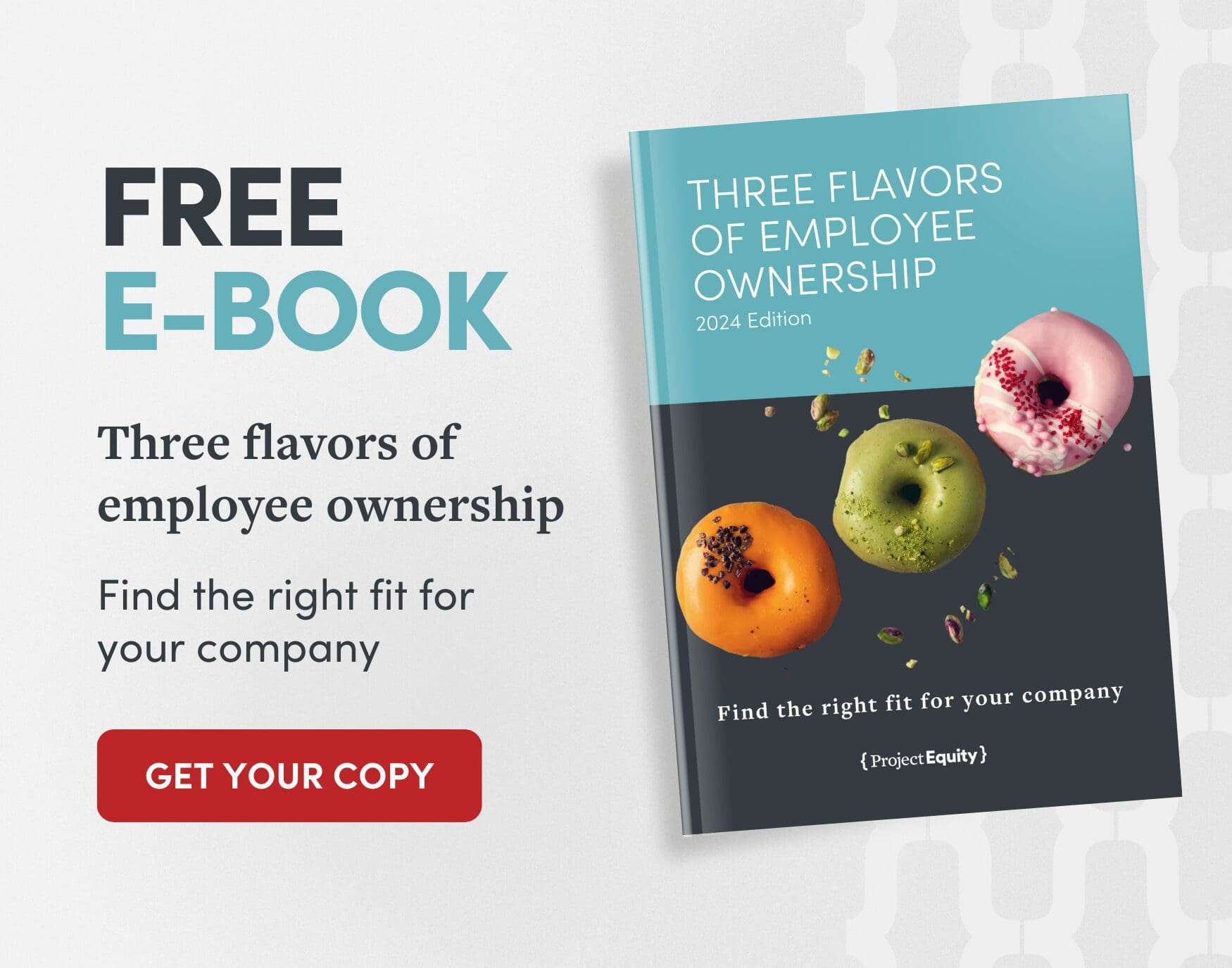How employee ownership helps you hire and retain talent
- David Gray
I recently had a chance to join Liza Sánchez, a recruiting expert and owner of 8 Bridges Talent Partners, and Bryan Cain, the CEO of the worker cooperative Atthowe Fine Art Services, in a webinar talking about how employee ownership helps with talent acquisition and retention.
Here are some key highlights from our conversation. You can also watch the entire webinar below:
The challenge: attracting and retaining talent
Hiring and keeping great people has never been more difficult. Economic uncertainty, student debt, high housing costs and shifting workplace expectations have all made recruiting more complex. Retention has become equally as difficult, as younger generations tend to “job hop” more often than older generations.
Liza shared that “Salary is often the first thing employees consider when looking for a job,” but younger workers today are also demanding meaningful work, flexibility and long-term financial security. Many are burdened by debt and are more selective about where they work—and why.
So, how do you build a workplace that people don’t just want to join, but stay in? For us, the answer lies in employee ownership (EO).
What is employee ownership?
Broad-based employee ownership means that employees hold at least 30% stake of the company. This can be done through several models—worker cooperatives, Employee Ownership Trusts (EOTs) or Employee Stock Ownership Plans (ESOPs). Each model varies in governance, participation and financial structure, but they all aim to give workers a real stake in the business.
As Bryan put it: “Ownership is real. It’s not some weird corporate promise—you have rights, you have obligations; you are an owner.”
Why EO attracts talent
At Atthowe, a specialized arts logistics company, Bryan saw firsthand how EO helped recruit passionate people who were ready to stay for the long haul. (Learn more about Atthowe’s story in this video.)
As Liza explained, being able to offer ownership as a benefit can entice potential applicants—especially for mission-driven businesses.
“It’s seen as a benefit, just like healthcare or retirement,” Liza said. “People get excited about the idea that if the company does well, they do well, too.”
In one survey, 31% – 38% of Americans surveyed responded that a Certified EO mark on a job application would make them more likely to apply to that job.
EO offers long-term value through profit-sharing, a voice in governance and a culture of shared purpose.
Why EO keeps people
Employee ownership, besides serving as a vehicle for attracting new talent, can also encourage employees to stay at their jobs longer.
Atthowe operates with a transparent financial model, open communication and a Board made up of employee-owners. Bryan explained, “There’s a distinct lack of isolation. I feel like I have a real partnership with this Board of Directors that have been in the trenches with me. I can now look around and say, ‘I think that person’s going to retire here.’ That didn’t used to happen.” Two of the reasons? Transparency and trust.
Retention is just as critical as hiring since it often costs more to hire and train a new employee than to keep them. Liza echoed Brian’s sentiment: “People don’t necessarily want to jump jobs. They want to stay—if they feel like they have a future.”
Ownership builds culture and accountability
Ownership shifts how people show up at work, developing into a specific culture of ownership found in EO companies. “There’s pride,” Liza said. “You’re not just a cog in the wheel anymore—you’re part of that leadership.”
That pride also leads to higher performance and productivity. We heard stories of and have worked with companies where employees are stepping up in ways they hadn’t before—joining committees, running for the Board or even leading presentations—simply because they cared more.
Is it all easy? No. Is it worth it? Absolutely
Ownership brings responsibility. Bryan joked, “It was so much easier when we could just blame [the former owner]. Now it’s like… it’s us.”
EO creates a culture where people aren’t just employees; they’re stewards of the business. They don’t just take direction; they help make it happen.
That’s what makes employee-owned companies such powerful places to work.
Final thoughts
Employee ownership creates a culture of purpose, stability and mutual success—one that attracts and keeps top talent in a way few other strategies can. Because when employees are owners, everyone wins.
If you’re curious about whether employee ownership might be right for you, Project Equity offers free consultations to help explore your options. Schedule a call today with one of our EO experts.
Want more insights on how EO benefits businesses?
- Grab a copy of our guide, Build a Loyal and Motivated Workforce With Employee Ownership.
- From leaving a lasting legacy to mitigating risk, dive into 10 reasons to go EO.
- Hear directly from more employee-owners like Bryan in our ownership stories.
Offering ownership stakes is viewed as a valuable benefit (akin to healthcare or retirement), appeals to candidates seeking long-term financial security, and aligns with mission‑driven workplace expectations
According to one NCEO study, employee‑owned businesses had a median job tenure that was 44% higher than non-EO companies. More transparency, a stronger culture, ownership opportunities, job training options and accountability all contribute to lower turnover.
Ownership fosters pride, heightened engagement, and productivity gains and reduces layoffs, ultimately driving better long‑term business outcomes.
About the author
David Gray is the Director of Client Services at Project Equity, where he has spent many years helping businesses transition to employee ownership. His entrepreneurial experience spans founding and operating retail ventures, launching startups, and managing business development initiatives across various sectors. He also has extensive training and experience in conflict mediation, and deftly facilitates difficult conversations, guiding them to creative solutions. His understanding of interpersonal dynamics helps build trust, develop leadership, and cast a vision for viable new organizational realities. His particular focus is on expanding innovative ownership models like Employee Ownership Trusts (EOTs).

Article details
Audience
Topic
Not applicable


